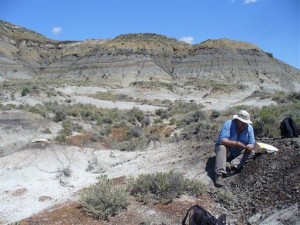 Researchers have demonstrated a flat, "stretchy" battery that can be pulled to three times its size without a loss in performance. While flexible and stretchable electronics have been on the rise, powering them with equally stretchy energy sources has been problematic.
Researchers have demonstrated a flat, "stretchy" battery that can be pulled to three times its size without a loss in performance. While flexible and stretchable electronics have been on the rise, powering them with equally stretchy energy sources has been problematic.
The new idea in Nature Communications uses small "islands" of energy-storing materials dotted on a stretchy polymer. The study also suggests the batteries can be recharged wirelessly.
Stretchy battery drawn to three times its size
Universe Has Finite Lifespan, Higgs Boson Calculations Suggest
 The discovery that so thrilled the scientific community last year may have opened the door to a glimpse of the future: the end of the world (and the universe) as we know it.
The discovery that so thrilled the scientific community last year may have opened the door to a glimpse of the future: the end of the world (and the universe) as we know it.
At the annual meeting of the American Association for the Advancement of Science this week, scientists worried the Higgs boston particle--sometimes called the "God particle"--may confirm a universe-ending disaster billions of years in the future.
Smallest planet yet found outside solar system
Astronomers searching for planets outside our solar system have discovered the tiniest one yet - one that's about the size of our moon.
But hunters for life in the universe will need to poke elsewhere. The new world orbits too close to its sun-like star and is too sizzling to support life. Its surface temperature is an estimated 700 degrees Fahrenheit. It also lacks an atmosphere and water on its rocky surface.
Meteorite fragments injure 700 in Siberia
 A hail of meteorite fragments landed in a vast swath of western Siberia Friday, causing injuries to more than 700 people, emergency officials in Russia said.
A hail of meteorite fragments landed in a vast swath of western Siberia Friday, causing injuries to more than 700 people, emergency officials in Russia said.
The fragments came down after a boom felt in three regions of Russia and neighboring Kazakhstan, the Russian news agency RIA Novosti reported. Gas supplies were cut off to hundreds of homes in the Chelyabinsk region as a safety precaution and about 20,000 emergency response workers were called out.
New Study Offers Proof: Asteroid Wiped Out Dinos
 The idea that a cosmic impact ended the age of dinosaurs in what is now Mexico now has fresh new support, researchers say.
The idea that a cosmic impact ended the age of dinosaurs in what is now Mexico now has fresh new support, researchers say.
The most recent and most familiar mass extinction is the one that finished the reign of the dinosaurs — the end-Cretaceous or Cretaceous-Tertiary extinction event, often known as K-T. The only survivors among the dinosaurs are the birds.
Nearest Earth-like planet 'in our own back yard'
 The nearest Earthlike planets could be just 13 light-years away, putting them in our cosmic "back yard", astronomers have claimed.
The nearest Earthlike planets could be just 13 light-years away, putting them in our cosmic "back yard", astronomers have claimed.
Six per cent of red dwarfs, the most common stars in our galaxy, have Earth-sized planets which could be habitable, according to data from Nasa's Kepler space telescope. On this basis, experts from the Harvard-Smithsonian Centre for Astrophysics calculated that the closest Earthlike world is probably as close as 13 light-years to Earth.
Obama honors scientists, researchers at White House
 President Barack Obama honored 23 scientists Friday at the White House.
President Barack Obama honored 23 scientists Friday at the White House.
“This is the most collection of brainpower we’ve had under this roof in a long time,” Obama said to laughter from the honorees and guests in the East Room, “maybe since the last time we gave out these medals.”
Each researcher received either the National Medal of Science or the National Medal of Technology and Innovation, called the nation’s highest honor for research and discovery.
More Articles...
Page 28 of 61

 Science Glance
Science Glance






























